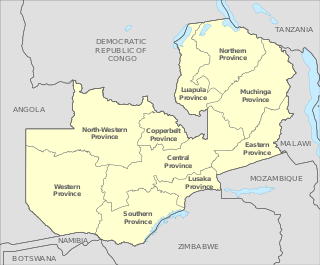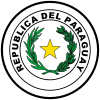
Mass media in Australia spans traditional and digital formats, and caters mostly to its predominantly English-speaking population. It is delivered in a variety of formats including radio, television, paper, internet and IPTV. Varieties include local, regional, state, federal and international sources of media, reporting on Australian news, opinion, policy, issues and culture.

La Nación is an Argentine daily newspaper. As the country's leading conservative newspaper, La Nación's main competitor is the more liberal Clarín. It is regarded as a newspaper of record for Argentina.
In the mass media in Bolivia there are nearly 200 privately owned television stations, but because rural regions of the country have few televisions and television reception is poor in many areas of the country, radio remains an important news disseminator. As of 2006, Bolivia had more than 480 radio stations, most of which were regional in scope. Bolivia also has eight national newspapers, in addition to many local ones. Of the national papers, four are based in La Paz, three in Santa Cruz, and one in Cochabamba. As of 2006, most Bolivians continued to get their news from newspapers and radio broadcasts.
El Nacional is a Venezuelan publishing company under the name C.A. Editorial El Nacional, most widely known for its El Nacional newspaper and website. It, along with Últimas Noticias and El Universal, are the most widely read and circulated daily national newspapers in the country. In 2010, it had an average of 83,000 papers distributed daily and 170,000 copies on weekends. It has been called Venezuela's newspaper of record.

Promotora de Informaciones, S.A. (PRISA) is a Spanish media conglomerate headquartered in Madrid, Spain. It is one of the largest media companies in Spain and all of Latin America, producing a wide variety of educational, cultural and informative content. PRISA owns a portfolio of newspapers, magazines, radio stations, and television networks. The majority subsidiaries and brands of the company are El País, Cadena SER, and Santillana.

Fernando Armindo Lugo Méndez is a Paraguayan politician and laicized Catholic bishop who was President of Paraguay from 2008 to 2012. Previously, he was a Roman Catholic priest and bishop, serving as Bishop of the Diocese of San Pedro from 1994 to 2005. He was elected as president in 2008, an election that ended 61 years of rule by the Colorado Party.
The mass media in Iceland are well-developed for a country of its size. The Constitution of Iceland guarantees absolute freedom of speech. Therefore, Iceland’s media are among the freest in the world.
The mass media in Peru includes a variety of different types of media, including television, radio, cinema, newspapers, magazines, and Internet-based web sites. Much of the print-based media in Peru is over a century old, with some newspapers even dating back to the time of independence.
The mass media in Armenia refers to mass media outlets based in Armenia. Television, magazines, and newspapers are all operated by both state-owned and for-profit corporations which depend on advertising, subscription, and other sales-related revenues. Armenia's press freedoms improved considerably following the 2018 Velvet Revolution.
The mass media in Cyprus refers to mass media outlets based on the island of Cyprus, including both the Republic of Cyprus (RoC) and the Turkish Republic of Northern Cyprus (TRNC). Television, magazines, and newspapers are all operated by both state-owned and for-profit corporations which depend on advertising, subscription, and other sales-related revenues.
Since 1991 Estonia has changed from being a former Soviet republic to a member of the European Union and the European Monetary Union, making a rapid transformation in several fields, including the mass media, which is a vibrant and competitive sector. For many years Estonia has been among the top ten in Reporters Without Borders’ (RSF) Press Freedom Index. In 2017 it was ranked 12th out of 180 countries by RSF while Freedom House assigned Estonia’s press freedom a score of 16/100. A cross-media landscape that embraces traditional media as well as the Internet and digital media characterises the contemporary media system in Estonia.

Mass media in the Philippines consists of several types of media: television, radio, newspapers, magazines, cinema, and websites.
The mass media in Gabon is primarily monitored by the Gabon government. Although the main newspapers are associated with the government, there are private broadcasters, and private weekly newspapers that are mostly controlled by opposition parties.
The mass media in South Sudan is underdeveloped compared to many other countries, including fellow East African states like Kenya, Tanzania, and Uganda. Poor transportation infrastructure and entrenched poverty in the country inhibit both the circulation of newspapers, particularly in states located far from the capital of Juba, and the ability of media outlets to maintain regular coverage of the entire country.
La Nación is a conservative daily newspaper published in Paraguay.

Mass media in Zambia consist of several different types of communications media: television, radio, cinema, newspapers, magazines, and Internet-based Web sites. The Ministry of Information, Broadcasting Services and Tourism is in charge of the Zambian News Agency which was founded in 1969. Due to the decolonization of the country, it ultimately allowed the media sector of the country to flourish, and enabled the establishment of multiple different new outlets, as well as established a new news consumption culture that wasn't previously known to Zambia. Furthermore, due to the short-wave capabilities, and international increase in production, demand, and sales of the transistor-radios in the country it made it increasingly more difficult to control the media outlets throughout Zambia by the leaders of the government.

Berta Rojas is a Paraguayan classical guitarist. She was awarded a Latin Grammy for her album "Legado" (2022) in the category of "Best Classical Album". The same album received another statuette for "Best Contemporary Classical Contemporary Composition" for Anido's Portrait, written by Sergio Assad. She has been nominated to the Latin Grammy on three other occasions: In 2012 she was nominated for Best Instrumental Album in the Latin Grammys for her album "Día y Medio " which she recorded with Paquito D’Rivera. For her album "Salsa Roja", she was nominated at the 2014 Latin Grammy Awards in the category of Best Classical Album. She got her third nomination in the 16th Annual Latin Grammy Awards for Best Tango Album for her album "History of Tango", which she recorded with the iconic Camerata Bariloche.
Various television networks, newspapers, and radio stations operate within Rwanda. These forms of mass media serve the Rwandan community by disseminating necessary information among the general public. They are regulated by the self-regulatory body.
The mass media in the Czech Republic refers to mass communication methods through broadcasting, publishing, and the Internet and their influence on population.








